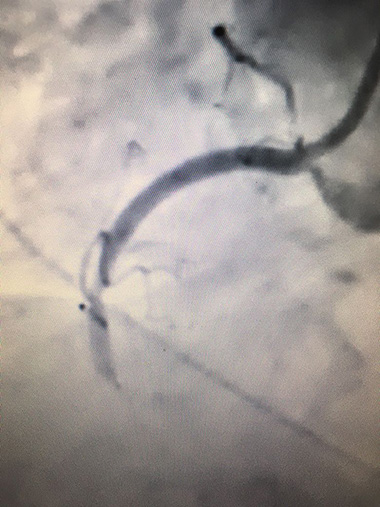Angina
Angina is a common cause of chest pain caused by a process called atherosclerosis, leading to narrowing of coronary blood vessels and subsequent reduced blood supply to the heart. This is often called coronary artery disease or ischaemic heart disease. Patients typically describe a heavy, tight or squeezing sensation in the centre or left side of the chest radiating towards the left arm, neck or jaw. Symptoms of angina often occur on exertion but can also develop at rest.
Angina requires urgent assessment, initially with specialist evaluation 12-lead Electrocardiogram (ECG), followed by consideration of non-invasive investigations such as an exercise tolerance test, CT coronary angiogram (CTCA), dobutamine stress echocardiogram (DSE) or nuclear myocardial perfusion scan (MPS).

Invasive coronary angiogram showing a blocked right coronary artery
Treatment usually starts with targeting and controlling known cardiac risk factors such as smoking, diabetes, high blood pressure, elevated cholesterol, and achieving lifestyle modification with diet and exercise. Patients with angina often require anti-anginal medication such as beta blockers, an emergency GTN spray, blood thinners such Aspirin, and cholesterol lowering medication such as a statin to control symptoms and reduce the risk of heart attack, known as myocardial infarction. Patients with high risk features may require invasive procedures including coronary angiography sometimes proceeding immediately to angioplasty with stent insertion or referral for cardiac bypass surgery.


